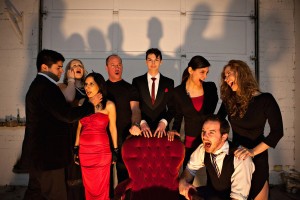
Soup Can Theatre’s double bill A Hand of Bridge & No Exit an exciting pairing for the Toronto Stage
Soup Can Theatre made an apt choice in pairing the “micro” opera A Hand of Bridge with Sartre’s No Exit. This seemingly loosely connected double billing of an opera with an existentialist play turned into an intuitive match in the interpretive hands of A Hand of Bridge director Pratik Gandhi and No Exit director Sarah Thorpe.
Not only do the two sixty-ish year old pieces share a contemporary relevancy, but their juxtaposition makes this relevancy more urgent.
Running ten minutes long, A Hand of Bridge really is an opera of micro proportions. But that’s all it really needs to be to get its point across – this is ten minutes of one game of cards on a single evening that represents the entirety of the lives of two couples. And no one is happy.
The four game-players don’t speak to each other except to call out cards, only able to reveal their true feelings and longings in singing monologue. The audience peeks in on a room of close friends and lovers who are ultimately strangers to each other because of their tragic inability to communicate, to connect.
While the singing and the accompanying orchestra were both beautiful, they unfortunately competed with each other acoustically. This meant much of the content of the monologues went unheard, at least to my ears.
I was able to piece together enough to understand the premise I outlined above, but in some cases I missed out on complete storylines. Plus, I have a feeling that the actual language of this piece was important, the interplay between the dialogue of the card game and the characters’ desires. It would surely have been a pleasure to catch more of this.
Regardless, it was a delightful – and pertinent – prelude to the highly satisfying No Exit.
A full-length play, Jean-Paul Sartre’s famous No Exit was certainly the bulkier half of the double bill. Echoing the sentiment of the evening’s first piece, the play is about three strangers shut together in an eternal and mutually created inferno. Essentially, hell is a room in which ill-matched strangers drive each other crazy forever and ever.
Soup Can‘s production does an excellent job of highlighting not only the inherently philosophical nature of this piece, but also makes it extremely entertaining! I’ve only seen small video adaptations of this play before so maybe I just have the wrong context, but they weren’t very funny – and this production was. Dark, and very funny.
My well-chosen guest for the evening is an enthusiastic student of Sartre’s existentialist philosophy and noted how well the concept of “the look” was done, a key element of this hell – the reflective gaze of others in which these characters must perpetually objectify themselves.
There is no resting in peace when one’s identify is constantly being pieced together from the outside.
No Exit is the play from which that famous line you might have heard “hell is other people” originates. It’s the fitting concept Soup Can uses to tie their double bill together, and which makes these pieces so relevant in today’s digitized social landscape.
I’m unsure whether our inability to connect and communicate has heightened since these pieces were written, or remained the same. I’m unsure whether society is even as disconnected as we like to suggest it is.
What I am sure of is that these pieces hold insights that speak into hopes and fears contemporary audiences share with generations six decades past. And that should make us feel connected – even if it’s through our mutual fear of division.
Details
- A Hand of Bridge & No Exit is playing at the Tapestry New Opera Studio in the Distillery District (9 Trinity St). until March 30th
- Shows run Wednesday to Saturday at 730pm with 2:00pm matinees on Friday and Saturday
- Tickets are $15.95 to $24.95
- Tickets are available online or one hour before curtain at the venue box office (cash only)

One thought on “Review: A Hand of Bridge & No Exit (Soup Can Theatre)”
Comments are closed.